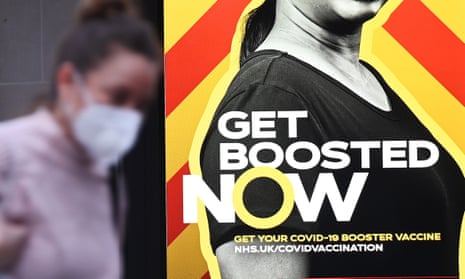About one in 13 people who have received two doses of a Covid vaccine are reluctant to get a booster jab, research shows.
A study by academics at University College London (UCL) found that 4% of 22,139 people taking part in its Covid Social Study were unwilling to get a booster, and a further 4% were uncertain whether they would do so.
Those who were hesitant were more likely to be from poorer backgrounds, have lower levels of education, and be under 45 years old, the study found.
Those who had been less likely to comply with government guidelines were also more reluctant to have a booster and so may contribute to spreading the virus, the researchers said.
People who had previously been reluctant to have a first dose were more than five times as likely to be uncertain or unwilling to have a booster, a finding that underlines fears raised by behavioural scientists and public health experts about making vaccinations mandatory.
Ministers should rethink how the booster campaign is conducted because of the risk of increasing inequality if people from poorer backgrounds are less likely to have boosters and therefore more likely to become ill with the virus, according to Dr Daisy Fancourt, who co-authored the study with Dr Elise Paul. The study has been published as a pre-print and has not yet been peer-reviewed.
“The Get Boosted Now campaign is very broad and it’s essentially set out as telling people what to do,” Fancourt said. “But it’s not addressing the barriers or perceived obstacles that people might have to getting a booster.
“We’ve shown that actually there are inequalities in terms of who is getting these booster vaccinations that threaten to increase socioeconomic inequalities in the effects of the pandemic.
“And also, unfortunately, it seems that lots of people not going for boosters are the people who are most likely to be spreading the virus most at the moment.”
The UCL Covid Social Study, involving 70,000 adults, is the UK’s largest inquiry into how people have reacted to the threat of Covid-19 and the restrictions imposed to reduce the spread of the virus.
Public health officials have emphasised that getting a booster jab makes people substantially less likely to become seriously ill if they are infected with a Covid-19 variant. A booster provides a 70-75% level of protection against symptomatic infection with the Omicron variant, and 90% against Delta, according to the UK Health Security Agency.
People may be reluctant because they feel they have enough immunity and have “done their bit”, Fancourt said.
“They now feel like it’s asking too much of them,” she said. “We really need to understand more why some people aren’t getting boosters.”
In January, low-paid workers were avoiding Covid tests because of a lack of financial support. People on zero-hours contracts are now worried about becoming ill from side-effects of the booster and missing days of work – a particular problem before Christmas, Fancourt added.
“We need to be cautious about making people feel forced into this decision now, but instead need to be focusing on fostering trust, which unfortunately has been eroded so much recently, and fostering a sense of community and doing your part, for the long term. [People feel that] if you’re having to coerce me into it then there must be a reason that you think I wouldn’t get it on my own – there must be something bad underlying this that you’re not telling me.
“Most people who are vaccine hesitant or unwilling aren’t actually anti-vaccine, they just have very legitimate, various concerns that they need to address themselves.”
